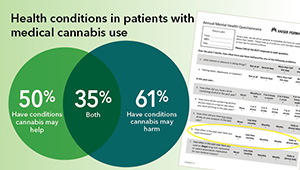Medication Use & Patient Safety
Research overview
Americans are using more prescription drugs than ever. Consequently, they’re coping with more side effects, drug interactions, and costs, especially if they’re using multiple medications. Kaiser Permanente Washington Health Research Institute (KPWHRI) scientists are on the forefront of answering questions about these concerns. We’re studying the beneficial and harmful effects of medications in real-world settings, and innovating better ways to manage and monitor drug use.
The institute contributes to national initiatives to monitor medication safety as well as providing information to help doctors and patients weigh the risks and benefits of various prescription drugs.
Funders of KPWHRI medication use and patient safety research include the Centers for Disease Control and Prevention, the U.S. Food and Drug Administration, the National Institutes of Health, the Patient-Centered Outcomes Research Institute, and other sources. A few projects include:
- Studying whether commonly used medications, including oral contraceptives, are associated with the risk of developing COVID-19 infection or severe disease
- Exploring patient and clinical risk factors for opioid misuse, abuse, and addiction
- Evaluating an intervention for patients taking long-term high-dose opioids to successfully taper their use without negatively impacting pain management and quality of life
- Proactive monitoring of medical products through the FDA Sentinel Initiative
- Studying medication safety for pregnant people and older adults
- Monitoring vaccine safety and effectiveness
- Investigating how medications affect risk of cognitive decline and dementia in late life
- Reaching out to inform patients and providers about the risks of, and alternatives to, commonly used medications that may contribute to falls, including over-the-counter antihistamines
Recent publications on Medication Use & Patient Safety
McNeil MM, Gee J, Weintraub ES, Belongia EA, Lee GM, Glanz JM, Nordin JD, Klein NP, Baxter R, Naleway AL, Jackson LA, Omer SB, Jacobsen SJ, DeStefano F. The Vaccine Safety Datalink: successes and challenges monitoring vaccine safety. Vaccine. 2014 Sep 22;32(42):5390-8. doi: 10.1016/j.vaccine.2014.07.073. Epub 2014 Aug 6. PubMed
Wu JW, Boudreau DM, Park Y, Simonds NI, Freedman AN. Commonly used diabetes and cardiovascular medications and cancer recurrence and cancer-specific mortality: a review of the literature. Expert Opin Drug Saf. 2014;13(8):1071-99. doi: 10.1517/14740338.2014.926887. Epub 2014 Jul 5. PubMed
Floyd JS, Psaty BM. The potential risks of expedited approval of drugs for acute bacterial infections. JAMA Intern Med. 2014 Sep;174(9):1436-7. doi: 10.1001/jamainternmed.2014.3055. Epub 2014 Jul 14. PubMed
Rasmussen-Torvik LJ, Stallings SC, Gordon AS, Almoguera B, Basford MA, Bielinski SJ, Brautbar A, Brilliant M, Carrell DS, Connolly J, Crosslin DR, Doheny KF, Gallego CJ, Gottesman O, Kim DS, Leppig KA, Li R, Lin S, Manzi S, Mejia AR, Pacheco JA, Pan V, Pathak J, Perry CL, Peterson JF, Prows CA, Ralston J, Rasmussen LV, Ritchie MD, Sadhasivam S, Scott SA, Smith M, Vega A, Vinks AA, Volpi S, Wolf WA, Bottinger E, Chisholm RL, Chute CG, Haines JL, Harley JB, Keating B, Holm IA, Kullo IJ, Jarvik GP, Larson EB, Manolio T, McCarty CA, Nickerson DA, Scherer SE, Williams MS, Roden DM, Denny JC. Design and anticipated outcomes of the eMGERG-PGx project: a multi-center pilot for pre-emptive pharmacogenomics in electronic health record systems. Clin Pharmacol Ther. 2014 Oct;96(4):482-9. doi: 10.1038/clpt.2014.137. Epub 2014 Jun 24. PubMed
Calip GS, Hubbard RA, Stergachis A, Malone KE, Gralow JR, Boudreau DM. Adherence to oral diabetes medications and glycemic control during and following breast cancer treatment. Pharmacoepidemiol Drug Saf. 2015 Jan;24(1):75-85. doi: 10.1002/pds.3660. Epub 2014 Jun 13. PubMed
Researchers in Medication Use & Patient Safety
 David E. Arterburn, MD, MPHSenior Investigator |
 Jennifer F. Bobb, PhDSenior Biostatistics Investigator |
 Jessica Chubak, PhDSenior Investigator |
 Andrea J. Cook, PhDSenior Biostatistics Investigator |
 Maricela Cruz, PhDAssociate Biostatistics Investigator |
 Sascha Dublin, MD, PhDSenior Investigator |
 Laura Harrington, PhD, MPHAssociate Investigator |
 Noorie Hyun, PhDAssociate Biostatistics Investigator |
 Lisa A. Jackson, MD, MPHSenior Investigator |
 Rita Mangione-Smith, MD, MPHExecutive Director and Senior Investigator, KPWHRI; Vice President for Research and Health Care Innovation, Kaiser Permanente Washington |
 Jess Mogk, MPHCollaborative Scientist |
 Jennifer C. Nelson, PhDDirector, Biostatistics; Senior Investigator |
 Gaia Pocobelli, PhDSenior Collaborative Scientist |
 Susan M. Shortreed, PhDSenior Biostatistics Investigator |
 Rod L. Walker, MSPrincipal Collaborative Biostatistician |
 Paige D. Wartko, PhD, MPHSenior Collaborative Scientist |
 Robert D. Wellman, MSPrincipal Collaborative Biostatistician |
 Karen Wernli, PhDSenior Investigator |
 Brian D. Williamson, PhDAssociate Biostatistics Investigator |
 Onchee Yu, MSPrincipal Collaborative Biostatistician |
 Weiwei Zhu, MSPrincipal Collaborative Biostatistician |
Affiliate researchers
Susan Heckbert, MD, PhD
University of Washington (UW) Department of Epidemiology; UW Cardiovascular Health Research Unit
David Siscovick, MD, MPH
UW Department of Medicine; UW Department of Epidemiology; UW Cardiovascular Health Research Unit
Leslie Spangler, PhD
Amgen















